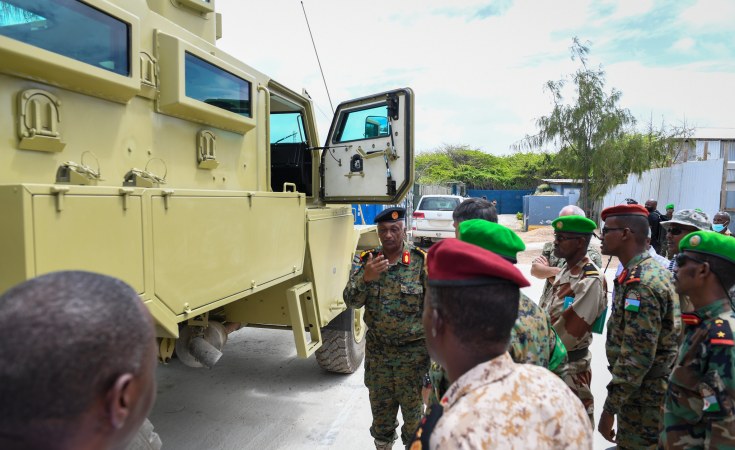Somalia is facing a dilemma over plans to continue a drawdown of peacekeepers from the country by a deadline of the end of 2024 because it's not known whether the country's poorly equipped security forces can put down al-Shabab militants' security threat to the government by that time.
Hussein Sheikh Ali, national security adviser for Somali President Hassan Sheikh Mohamud, wrote to the United Nations requesting a 90-day delay in the second phase of the departure of African Union Transition troops in Somalia.
Somalia "formally requests a technical pause in the drawdown of the 3,000 African Union Transition in Somalia uniformed personnel by three months," the letter read.
According to the letter, if continued under the current plan, the pullout would mean the departure of 3,000 troops by the end of September.
A diplomatic source in the government who requested anonymity because of a lack of authority to comment on the issue confirmed to VOA the authenticity of the letter. The source said the government wants to buy time for its effort to have an arms embargo lifted -- a campaign supported by Ethiopia and Uganda, two regional powers.
"Somalia believes its campaign for lifting the U.N. arms embargo depends on proving that it can take the responsibility for its security without the dependence of AU peacekeepers, so it can better fight al-Shabab terrorists. At the same time, it does not want ATMIS [the African Transition Mission in Somalia] with its stronger military hardware to leave the country in the middle of unpredictable war with al-Shabab," the diplomat said. "It is buying a time."
Appeal to General Assembly
In an exclusive interview with VOA, Somali Prime Minister Hamza Abdi Barre said he would appeal to the U.N. General Assembly this weekend about removing an international arms embargo, so Somalia could be capable of eliminating al-Shabab, a U.N.- and U.S.-designated terrorist organization that has fought the Somali government for 16 years.
A U.N. resolution calls for the ATMIS force to be reduced to zero by the end of next year, surrendering security responsibility fully to the Somalia's national army and police forces.
The Somali government had repeatedly said it would be ready to take over security responsibilities from ATMIS when those troops withdrew from the country, in line with U.N. Security Council Resolution 2687.
Mohamud, who is in central Somalia to command the government fight against al-Shabab, said on August 18 that he believed the government would "eliminate" the jihadists by the end of the year.
According to the government letter to the United Nations, during the ongoing military offensive against the al-Qaida-affiliated al-Shabab militant group in central Somalia, the government had "managed to re-liberate towns, villages and critical supply routes."
The government military gains, however, did not prevent the militant group from waging deadly counterattacks on government bases.
The government letter said the military operation had suffered.
"Several significant setbacks" have occurred since late August, the letter said, following a deadly dawn attack by the militants on a newly captured base in the village of Cowsweyne, Galguduud region, in central Somalia.
As a result of the attack, the Somali military suffered heavy losses, forcing other military units to retreat from towns and villages captured in recent months in the same region.
"This unforeseen turn of events has stretched our military forces thin, exposed vulnerabilities in our front lines, and necessitated a thorough reorganization to ensure we maintain our momentum in countering the al-Shabab threat," the letter said.
"We hold firm in our belief that this technical pause will, in the long run, contribute to the enduring peace, stability and prosperity of Somalia," it said, adding that the government remained fully committed to the complete ATMIS drawdown by the end-of-2024 deadline.
Security experts in Somalia said al-Shabab militants have been withdrawing from towns and villages and retreating into the bush with the intention of prosecuting a prolonged guerrilla war.
The government request to the United Nations came days after ATMIS announced it had kicked off the second phase of the drawdown, with the projected departure of 3,000 troops by the end of September.
Since the beginning of the ATMIS drawdown, 2,000 AU troops had left by the end of June, and six bases have been handed over to Somali forces.
Before the troop reductions began, ATMIS was made up of about 20,000 uniformed personnel drawn from Burundi, Djibouti, Ethiopia, Kenya and Uganda.
Some information for this report came from Agence France-Presse.


